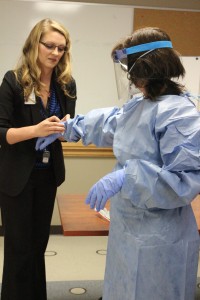Windsor prepares for possible ebola cases

WINDSOR Ont. – Nurses will work in a buddy system to ensure proper protocol is followed for personal protective equipment. A presentation for the media was held Monday Oct. 20 at Windsor Regional Hospital. Photo by Angelica Haggert/Media Convergence
As the death count from ebola creeps to 5,000, Windsor-Essex area hospitals are preparing for the possibility of a local case.
At a presentation for local media on Monday Oct. 20th, Windsor Regional Hospital demonstrated their preparations for health care worker safety. Erica Batalli, Manager of Infection Control, and Karen Ridell, Director of Clinical Development and Practice walked the media through the “donning and doffing” of personal protective equipment.
“We are prepared as possible,” said WRH’s chief executive officer Karen McCullough. Both McCullough and Dr. Paul Bradford, an emergency room physician, answered questions and spoke about the hospital’s preparedness.
“It’s important to note, a positive ebola patient in Windsor would not stay in Windsor,” assured McCullough. The nearest hospital that has been designated for ebola patients is London. But Dr. Bradford said that system still needs work.
“We have to develop procedures as a region to transport patients to designated areas,” Dr. Bradford said the Windsor-Essex hospitals need to work together.
Windsor-Essex hospitals, along with many hospitals nationwide, have added a question to the screening process in emergency rooms. Typically, patients in an emergency room are already asked if they have a cough, fever or are feeling “generally unwell.” In mid-August, when the outbreak of ebola began in Africa, the question “have you traveled to Africa within the last 21 days,” was added to the screening process.
Batalli and Ridell put on the commonly-used personal protective equipment, describing each step as they went.
“Where we’ve learned the point of contamination was in the case in Dallas was the removal of the mask,” Batalli described, referring to the case of Nina Pham, Dallas nurse who contracted ebola and has since been cleared of the virus. “There are continually points where contamination could occur,” Ridell said, recommending that hand washing occur between each step of removal.
Windsor hospitals have re-trained all necessary staff on proper application and removal of basic protective gear. A higher standard of protective gear will be worn in the case of a positive ebola diagnosis. That suit could not be demonstrated at the media presentation.
“There are 100 suits available at this site (Windsor Regional) and 150 at the Met campus,” Ridell said. No one at the presentation was trained to wear the suits.
“We’re working on making sure there’s always someone scheduled who has been trained,” said Dr. Bradford. “We changed a lot just this last Friday night (Oct. 17) in emergency procedures. We’re still working on it.”
Visit here for a radio piece
Check out this for a video piece


